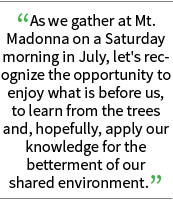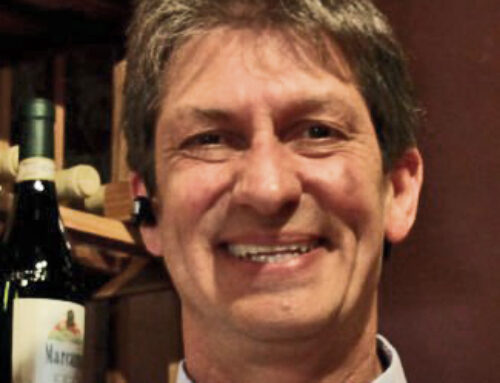California has a program of forest carbon offsets . . . Is it working?
By Mike Monroe

Mike Monroe
“Once it gets in your bones” . . . the energy of the redwood forest will live and thrive within us. That’s how I feel whenever I’m at Mt. Madonna. There is always more to experience, more to learn about this special, almost magical, place.
One of my favorite books is “The Curious Naturalist.” It’s a favorite because I can never get enough of reading, observing, and questioning about the wonders of the redwoods. So this visit to Mt. Madonna, like all of the ‘Hike with Mike’ outings, is intended to encourage conversation and reflection.
My program outline is simple — we will get acquainted, and then launch into a lively give-and-take while stretching our legs and enjoying nature. Where to begin.
What’s new at Mt. Madonna?
How are the white deer doing? Are they white or albino?
Speaking of albinism . . . are there albino redwoods or chimera at Mt. Madonna?
Have you seen the May 2022 issue of National Geographic entitled “Saving Forests”?
How are the redwoods doing?

What’s the story behind the place names of the Sprig Trail and the Arthur Mine?
Who was the “Bard of Mt. Madonna” and why did he not get along with Henry Miller?
Are there ghosts at Mt. Madonna?
The landscape at Big Basin was dramatically altered two years ago by the CZU fire. What have the redwoods taught us about that experience?
What happened to the wildlife at Big Basin, especially to endangered species like the marbled murrelets or the steelhead trout?
Spoiler Alert! Take a few minutes to watch a spectacularly beautiful, short video on the Sempervirens Fund website about the murrelets. (www.sempervirens.org/?s=Frans+Lanting.)
Are the redwoods at Mt. Madonna aging into ‘old-growth’ status?
What is the legacy of Smokey the Bear?
 What is restoration forestry and early successional habitat creation?
What is restoration forestry and early successional habitat creation?
How does the California 30×30 initiative link to Mt. Madonna?
What is the difference between prescribed fire, controlled burns, managed wildfire, cultural burning and the new term — “mega-fire”?
Why were eucalyptus trees planted in Mt. Madonna’s redwood forest?
Are the trees and plants of the redwood forest able to communicate about water availability and invasive pests?
What are the climate forecasts in terms of temperatures, rainfall and fog?
What are the best management practices to preserve the redwoods at Mt. Madonna?
Miner’s Lettuce vs. Indian Lettuce . . . What’s the difference?
Should landscape management be active, passive, holistic, or none at all?
Is there evidence of a Native American presence at Mt. Madonna?
Should management efforts focus on access and recreation, or promoting biodiversity, or building climate change resiliency? What’s the best blend?
California has a program of forest carbon offsets . . . Is it working?
 With a nod toward full disclosure, the answers to many of the posed questions are not simple and require a variety of tradeoffs. Still, our amateur status does not preclude us from making observations and expressing our viewpoints, all the while acknowledging that we are all moving up the learning curve.
With a nod toward full disclosure, the answers to many of the posed questions are not simple and require a variety of tradeoffs. Still, our amateur status does not preclude us from making observations and expressing our viewpoints, all the while acknowledging that we are all moving up the learning curve.
So many questions and challenges. As we gather at Mt. Madonna on a Saturday morning in July, let’s recognize the opportunity to enjoy what is before us, to learn from the trees and, hopefully, apply our knowledge for the betterment of our shared environment.
Mike Monroe is an amateur historian and naturalist who enjoys all the wonders of the southern Santa Clara Valley. Mike and his family have resided in Gilroy since 1986.






